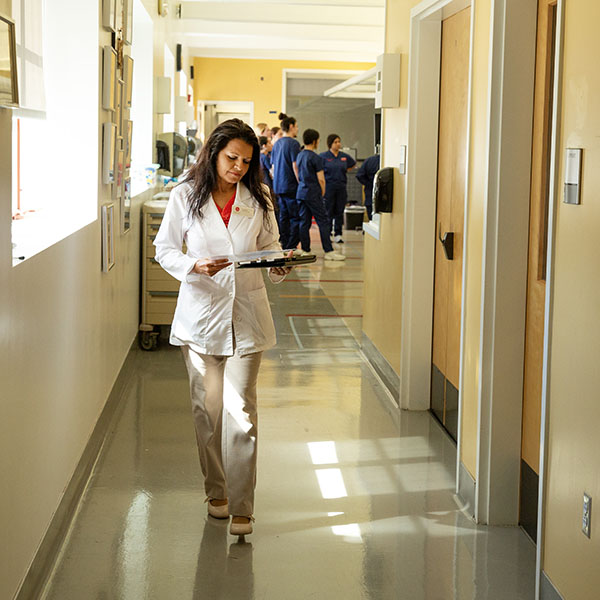by Kim Lamb Gregory
 Students can learn the skills to become a nurse, but Assistant Professor of Nursing
Neomie Congello believes you also need something that can’t be taught.
Students can learn the skills to become a nurse, but Assistant Professor of Nursing
Neomie Congello believes you also need something that can’t be taught.
“Passion is key,” she said. “You absolutely have to love people - caring for people and wanting to make a difference. If you don’t have that passion, nursing might not be for you.”
Even before she joined CSU Channel Islands (CSUCI) almost 10 years ago, Congello’s passion for nursing inspired her research into physical activity among Mexican American women, cardiac care and a new educational model for nursing students in area hospitals.
Congello grew up in British Guyana in South America, later becoming part of the first generation in her family to earn a college degree after moving to the U.S.
Congello earned her two-year nursing degree at Dutchess Community College in upstate New York, then transferred to the State University of New York (SUNY) for her bachelor’s degree in nursing. She was signed up to earn her master’s degree from SUNY when fate intervened.
“I was working the evening shift, and my car went off the road in a snow storm late at night and I was scared,” she said.
Congello cancelled her enrollment to SUNY, moved to sunny Southern California and enrolled in CSU Los Angeles (CSULA) to continue her nursing education. She went on to receive her Ph.D. from the University of California Los Angeles (UCLA) School of Nursing.
Congello also began working in the cardiac care unit at St. John’s Regional Medical Center in Oxnard, which she said later inspired her teaching style at CSUCI.
“Through my firsthand experience working with acute cardiac patients, I am able to bring valuable insights into the classroom of the nurse's role when medical interventions are needed,” she said.
Cardiac care also inspired her dissertation, which was about physical activity and Mexican American women.
“I found a gap when it came to women of Mexican descent,” she said. “It was shown that they were less active even though they were doing manual labor and housework.”
Congello learned that the physical activity they were getting was not leisure activity, which made a difference.
“It was more stressful, and stress can lead to cardiovascular disease,” she said. “Doing leisure time physical activity decreases stress because you are walking and focusing on the flowers and sunshine rather than mopping the floor.”
Another major contribution Congello made to the CSUCI Nursing program was her work with a relatively new educational model called the Dedicated Education Unit (DEU) at Los Robles Regional Medical Center in Thousand Oaks, Thousand Oaks Surgical Hospital and Community Memorial Hospital in Ventura.
When CSUCI nursing students are doing the clinical part of their education in a hospital setting, each faculty member oversees anywhere from six to 10 students. Congello helped to set up a DEU at the hospitals in which staff nurses are trained to become clinical teachers and can work one on one with nursing students.
“Nursing students get one-on-one time with a trained nurse,” Congello explained. “They shadow, they learn, and they become familiar with skills required in the clinical setting. They get their clinical experience doing hands-on patient care.”
The DEU is a win for hospitals, too, Congello said, as they are always looking to recruit new nurses, and this gives them on-the-job experience at a hospital where they might get a job after graduation.
